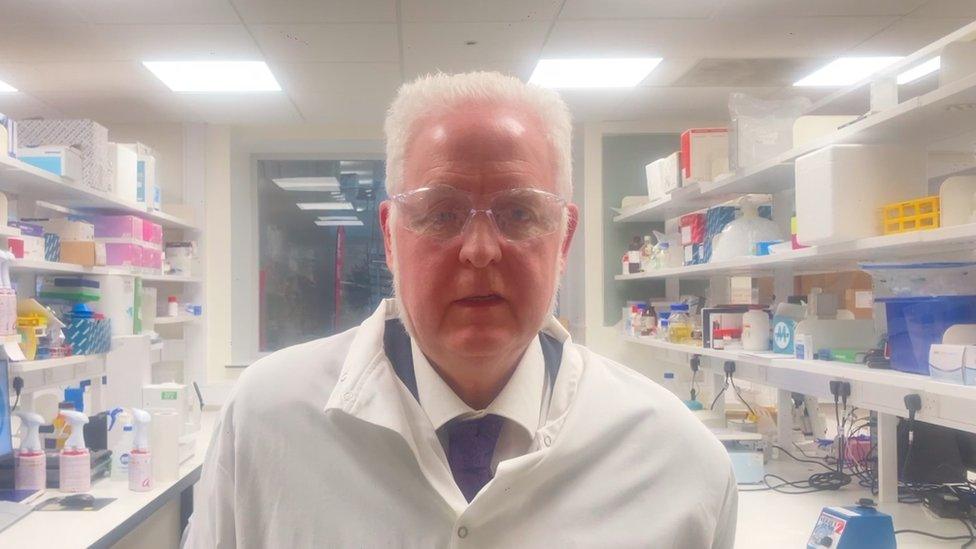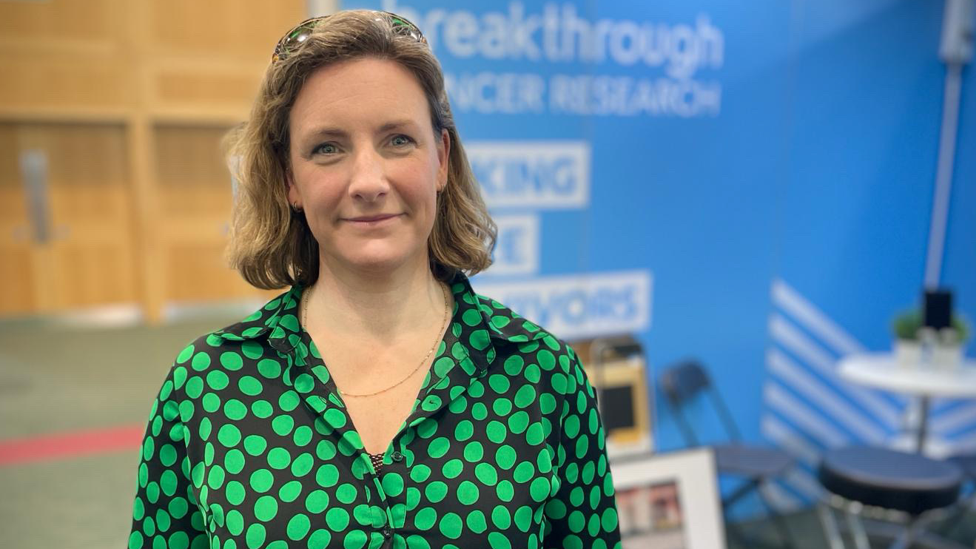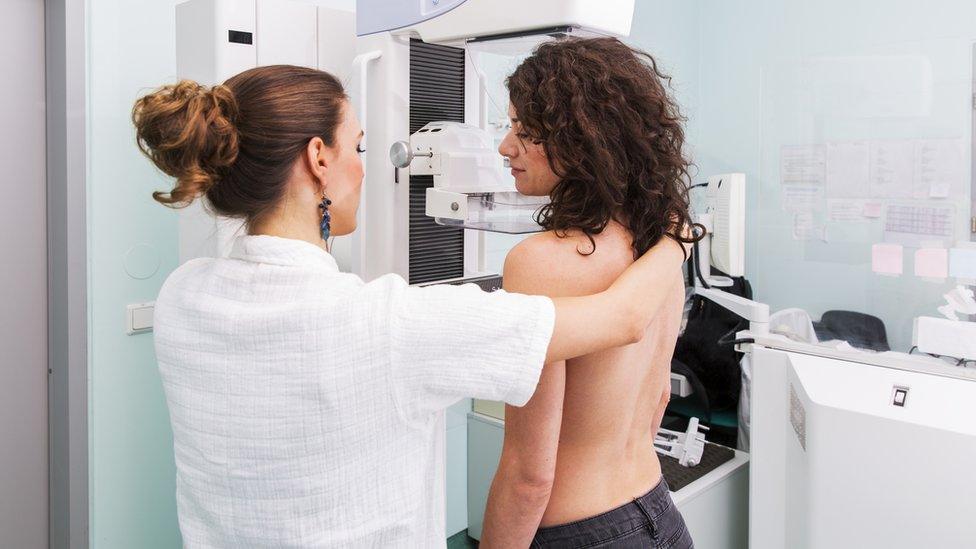Cancer: Call for more all-Ireland cross-border co-operation
- Published
Edward McDaid said tackling cancer on an all-Ireland basis "makes sense"
A County Donegal man who had lifesaving treatment at the North West Cancer Centre (NWCC) has said "borders don't matter" when fighting cancer.
Edward McDaid, 67, who lives in Ramelton in County Donegal, had radiotherapy at Altnagelvin after being diagnosed with prostate cancer in 2020.
Tackling cancer on an-Ireland basis "makes sense", he told the BBC.
And a leading academic has called on both governments to "work harder together".
Prof Mark Lawler, associate pro vice-chancellor at Queen's University, said sharing knowledge and funding could mean governments would fight cancer "which is the common enemy" instead of "competing against each other".
He said governments should "work closer and harder together to conquer cancer and deliver better for patients across the island".

Professor Mark Lawler says governments should "work closer and harder together to conquer cancer and deliver better for patients across the island"
Aside from the congenital heart disease network and the North West Cancer Centre in Derry, academics and clinicians say there is little cross border activity in joint cancer policy or research.
While there is evidence of patients travelling from the ROI to NI there is little sign of traffic going the opposite direction.
Now that the Northern Ireland Assembly is functioning again, attentions are turning to what opportunities are out there to improve better health outcomes on a shared basis.
Mr McDaid said that when he fell ill, he wanted to start treatment as soon as possible and as close to family as possible.
"The border didn't matter to me one iota," he told BBC News NI.
"You want to be near family - that's what it does to you.
"We can't see this disease. It's something which just seems to creep up on you and all of a sudden it is there."
Cross-border treatment funding
The North West Cancer Centre (NWCC) at Altnagelvin Hospital in Londonderry treats more than 1,000 cancer patients annually - about 300 of whom are from the Republic of Ireland.
The facility is funded in part by the Irish government.
Since it opened in 2016 about one in five cancer patients from County Donegal have been able to receive treatment closer to home, rather than in Galway or Dublin.
On a site visit, Neasa Hourigan, a member of the Oireachtas (Irish parliament) health committee, said investment in the NWCC is "money well spent" for the Irish government, and the cross-border clinical care model could be reproduced elsewhere on the island.
"It's supporting people's well-being, it's supporting their health - so it's money very well spent," she said.
"If the services are there, and they aren't far away, we should all be pooling our resources and working as hard as possible to make it make sense for patients."
But there is no overarching framework for cross-border care.
Northern Ireland's cancer statistics are the worst in the UK and parts of Europe, and many experts feel more cross-border interventions would improve standards.
Good Friday Agreement
As well as its impact on peace and reconciliation, the Good Friday Agreement attempted to tackle cancer on all island basis.
In 1999, after the agreement, a Memorandum of Understanding was signed between the respective departments of health in the Republic of Ireland, Northern Ireland and the US National Cancer Institute (NCI).
That triggered an agreement designed to develop links between cancer researchers, physicians and other health healthcare professionals across Ireland and the United States.
It is called the Ireland-Northern Ireland-National Cancer Institute Cancer Consortium.
While it has been delivering high quality research involving students from both sides of the border who are based in Washington, many believe there remains an untapped pool of knowledge and opportunity - and room for both governments to develop cancer policy on an joint all-Ireland basis.
Prof Lawler is the link in the tripartite agreement and operates between Belfast, Dublin and Washington.
"The Good Friday Agreement recognised cancer as something that the three countries had in common," he said.
"At the time it was clear cancer in Ireland was a big challenge. In Northern Ireland, pretty much every cancer had the worst outcomes in the UK and similarly it was the same in the Republic. Tackling it together felt as though it could be the health dividends of peace."
In 2021, Health Minister Robin Swann signed a memorandum of understanding between Northern Ireland, the Republic and NCI to "reinvigorate and re-prioritise" the All-Ireland Cancer Consortium.
All-Ireland Cancer Network
Separately, the All-Ireland Cancer Network (AllCaN) was established to improve survival rates on less survivable cancers.
It aims to tackle why the long-term survival rates for certain types of cancers differ depending on which side of the border a patient lives.
It started by considering oesophageal cancer.
The five-year survival rate for people with this type of cancer in the Republic of Ireland is 24%, while in Northern Ireland it is 19%.
AllCaN also gathers samples and data from patients on both sides of the border with Barrett's Oesophagus, a pre-cancerous condition.
Cross-border researchers use the data to identify potential inequalities across demographics, healthcare systems and impact outcomes for patients.

Orla Dolan says "research isn't a luxury"
Orla Dolan, chief executive of Breakthrough Cancer Research, which funds the network, said experts across the island of Ireland "can learn from each other, so people on both sides can benefit".
She states it's "not good enough" that some cancers have survival rates between 80-90% while others "haven't seen any improvement in 50 years".
"Research isn't a luxury, it's a necessity that we must do if we are going to increase the amount of people who can survive cancer."
'Beacon of light'
In February, after nearly three years of treatment, Mr McDaid officially became a cancer survivor.
He said being treated in Altnagelvin was a one-hour door to hospital door "lifeline".
"Being an hour away allowed me to have some sort of life while continuing with treatment. I can't thank everyone at the cancer centre enough. It was a beacon of light in a very dark time for me."

Cross-border cancer care in numbers
Collaborative cancer research on the island of Ireland has doubled since 1999
More than 35,000 cancer patients have been enrolled in clinical trials since 1999
More than 500 healthcare professionals and scientists from Ireland were trained at the US National Cancer Institute
Outcomes for breast cancer in Northern Ireland went from being the worst in the UK to the best in the UK in less than two decades

Related topics
- Published26 October 2023
